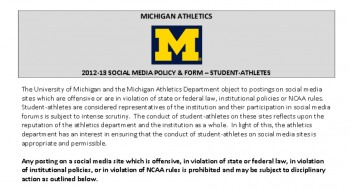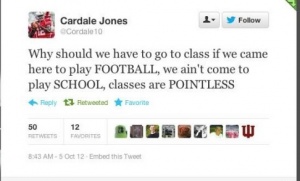Student-Athlete Social Media Monitoring
Contents
Overview and Goals
Third-party social-media monitoring companies are hired by athletic departments to monitor not only what student athletes post online, but also to monitor what is posted about their student athletes. The goal of social media monitoring is to prevent the misuse of social media that can negatively affect the brand of the institution or athlete. It is also used to promote proper use of social media for athletes that can uphold the positive reputation of the institution and make the student more marketable as an athlete and future employee [4]. Oftentimes, athletic departments have public and media relations departments that have employees tasked with monitoring the athletes. This monitoring occurs at events and in virtual environments, as to protect the image of a team or university. The official rights of these employees vary, but they tend to have enough influence to try to curb the amount of damage done by athletes on their public accounts.
Strategy
Third Party Companies
Student-athlete social media monitoring companies appeal to the institutions’ athletic departments by promising to continuously and actively monitor the social media pages of student athletes. This is done in order to quickly identify and revoke any potentially damaging or embarrassing media coverage for the institution. They also ensure that the athletic department will be able to better enforce that the institution’s code of conduct is followed online and to prevent any negative impact on the institution’s reputation. The software is also advertised as just pennies per athlete [5].
To appease the potential agitation of student athletes, the companies provide services with the goal to be in the best interest of the student athlete. The companies ensure confidentiality of the student athlete’s digital content. They also note that positive use of social media will prevent any negative impacts on recruiting for future employment or pending scholarship offers for the student athlete [6].
Procedure
The institution provides a list of trigger words that will produce an alert once it has been identified by the software. Trigger words at institutions such as University of Kentucky and University of Louisville include “porn,” “robbery,” “doobie,” “beer bong,” and “Sam Adams” [3]. Once a negative post or potentially damaging post by a student athlete is identified as containing a flagged word, the company notifies a coach, a department representative, or an assistant, often via email. Once the institution has been notified, it is in their hands to implement the discipline or course of action.
Software
Companies such as Varsity Monitor use software that scan, aggregate, and filter social media content [6]. Student athletes are required to provide access to their social media sites for such companies in order to participate on their respective team. Other companies, such as UDiligence, use applications that follow the Terms of Service of the social media networking site. UDiligence advertises this less invasive process by stating they do not require “access to, or use of, the student-athlete's username/password or friending of anyone to monitor their accounts” [5].
Services
Social media monitoring services for the entire athletic department usually cost between $6000 and $7500 annually [7]. Other services from the third party companies include educational programs. The programs are designed to educate student athletes on how to positively promote their brands and reputations with the use of social media. The programs also provide examples of damaging posts or content that has resulted in negative consequences for student athletes in the past.
Popular Social-Media Monitoring Companies
- UDiligence
- Varsity Monitor
- Centrix Social
- Jump Forward
- Socialverse
Schools Utilizing the Services
- Texas Tech
- Texas A&M
- Baylor
- University of Florida
- University of Michigan
- University of Louisville
- University of Kentucky
Consequences
Once an administrator or coach is notified of a flagged word posted by a student athlete, the department or coach may take steps to discipline the student athlete. The punishment may range from a talk with the student athlete, to suspension from a competition, to removal from the team [8], depending on the institution and content of the provocative post.
Student-athletes have become much more aware of what they are posting to social media because of the consequences that they may face from the athletic department if there is an inappropriate post. Student-athletes have been educated that they not only represent themselves on their social media platforms, but they also represent the universities that they attend. These issues have become more prevalent at larger institutions with larger fan bases, who are constantly in the public eye of their devout fans on social media. While student athletes at smaller institutions may be able to post freely without fear of consequence, those at larger institutions have to be very attentive to their posts in order to ensure that they are within the guidelines that have been set for them by either the athletic department or coaching staff.
Ethical Concerns
Privacy
Those opposing the practice argue that it violates a student’s First Amendment Rights to freedom of speech. The schools monitor their students’ pages for phrases they do not like or find inappropriate and therefore censor their student athletes. Others argue that it violates a student’s Fourth Amendment Rights, which ensures “the right of the people to be secure in their persons, houses, papers, and effects, against unreasonable searches and seizures” [9]. Those argue that the content of the student athletes’ social media pages, although not a physical object, should also be protected under the Fourth Amendment. This is under the school of thought, first stated by Deborah Johnson, that this technological issue is an extension of a preexisting dilemma, meaning the same ethical theories should be applied [10]. Bradley Shear, a Washington, D.C., attorney equates the practice of monitoring social media content to placing a bug in the student’s residence [7] and he calls the practice “unbelievably outrageous.” Others are concerned that there is sure to be a breach of privacy, and student athletes digital content could potentially be made public [7] . Some states, including California, Delaware, and Maryland, are working toward placing a ban on the practice.
Those in favor of the practice, namely athletic department heads and coaches, argue that it is not an invasion of privacy since the content they monitor is actually in a public setting [7] . Student athletes are high profile representatives of the institution, and therefore, whatever they tweet, put on Facebook, or blog about is a representation of the views of the institution and the individual's peers and teammates. Because of this, athletic departments and administrators believe it is their right to monitor and track the social media content of their student athletes.
Endorsement
Many student athletes gain an ample amount of followers from the publicity they receive from their sport. Because of this, companies often reach out in hopes that the athlete will endorse their product on their social media. However, schools that monitor student-athlete social media ban their athlete's from endorsing any products. Athletes are not allowed to receive any kind of payment for their participation, and many colleges classify endorsement as a monetary gain from their position. This issue emphasizes that the lines between an athlete's personal use of social media and the prospective school's management of social media are heavily blurred.
See Also
References
- ↑ "Social Media Glossary Terms"., Marketo, B2B Social Media Glossary Terms
- ↑ Financial Times Lexicon, retrieved April 22, 2019., Social Media Monitoring
- ↑ 3.0 3.1 Laird, Sam., "Inside the Battle for College Athletes' Social Media Lives"., Mashable, August 20, 2012., Inside the Battle for College Athletes' Social Media Lives
- ↑ "student-Athletes and Social Media Monitoring: A conversation with Varsity monitor"., Fourth And 140, Student-Athletes and Social Media Monitoring: A Conversation With Varsity Monitor
- ↑ 5.0 5.1 "How Does UDiligence work?"., UDiligence, How does UDiligence work?
- ↑ 6.0 6.1 "See What Varsity Monitor can Do for Your Organization"., Varsity Monitor, See What Varsity Monitor Can Do For Your Organization
- ↑ 7.0 7.1 7.2 7.3 USA Today, University of Kentucky, Louisville monitor athletes' tweets
- ↑ Jump Forward Form, found at https://college.jumpforward.com/index.aspx and logging in
- ↑ Wikipedia, Fourth Amendment to the United States Constitution
- ↑ The Cambridge Handbook of Information and Computer Ethics. Edited by Luciano Floridi. Cambridge University Press, 2010. (33)

